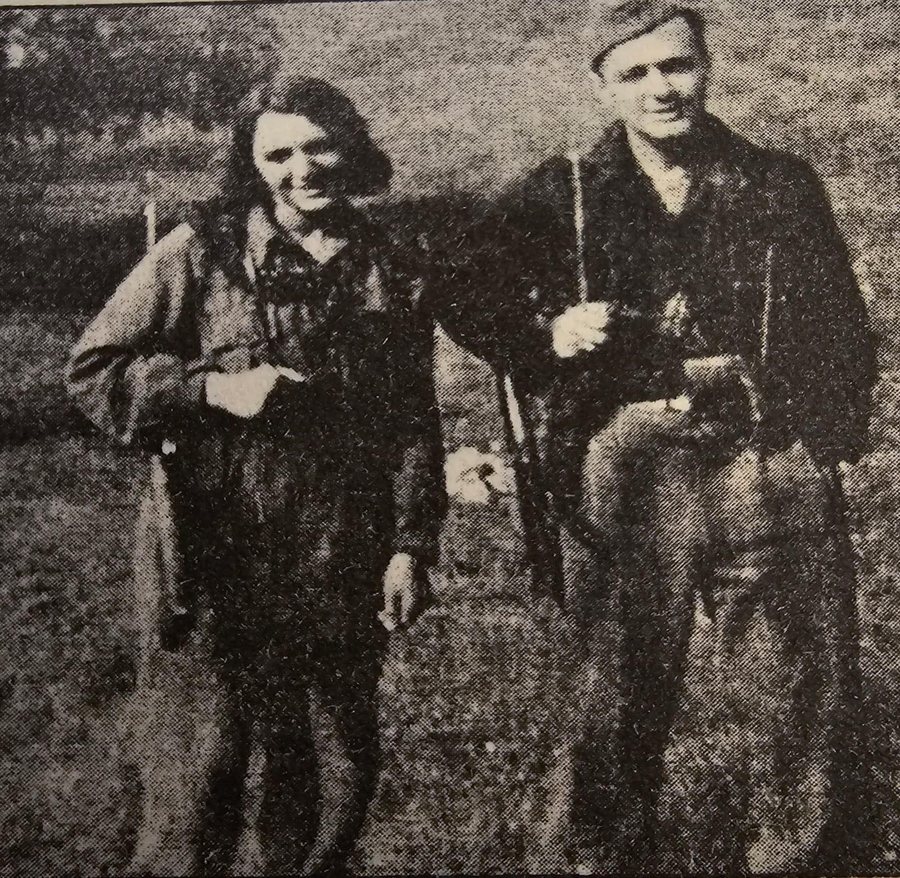
In our family archive, there is a photograph of my grandfather and grandmother, Dhimitër and Mynever Shuteriqi, with weapons and partisan uniforms in the mountains of Elbasan in the summer of 1944.
In this photograph, two young people in love appear, convinced that they will soon defeat the Germans.
A few months later, this happened.
The Germans left Albania in November 1944 and their army capitulated in May 1945.
If my grandmother and grandfather were still alive today, they would celebrate the Victory over Nazism as the most important day of their lives filled with war memories.
Together with them, millions of Europeans, Russians, and Americans would celebrate what has gone down in history as VE Day, or Victory in Europe Day.
But unfortunately, the countries that won the war, the former allies, are celebrating VE Day, or the 80th anniversary of the victory over fascism, separately.
Western Europe celebrated yesterday on May 8, while Russia is celebrating today on May 9. America hardly celebrates this date at all, because it is busy with other things.
This deliberate confusion of dates fills me with hope that we can be Europeans very soon, because being ridiculous is no longer considered a sin in Europe.
Dividing the victory into two parts, on May 8th and 9th, seems like the platform of the old Albanian parties, which celebrate the liberation of our country on two different dates, on November 28th and 29th.
But if in Albania politicians quarrel when the last German left Shkodra riding a bicycle with flat tires of a famous pianist, the Europeans and Russians go even further.
They quarrel for a minute.
And here's why.
Germany capitulated on Thursday, May 8, 1945 at 23:01, when the Act of Surrender signed in Berlin came into effect, but since this date in Moscow was 00:01, Russia celebrates one day later on May 9, as is happening today, while Europe celebrates one day earlier on May 8, as happened yesterday.
During the communist era, European countries celebrated these liberation dates according to the camps they were part of. West Germany, England and France celebrated on May 8. East Germany, the Czech Republic and Poland, together with Russia, on May 9.
Today, Germany celebrates the victory over Nazism on May 8, as does the Czech Republic, since it has entered the European Union, but even Ukraine, which used to celebrate May 9, has moved to the May 8 hemisphere.
So for one minute past midnight, the Russians and Europeans have divided the continent in two, as if 50 years of the Cold War weren't enough.
This ridiculous timing becomes painful when you remember that the Americans, without whom Western Europe could not have been liberated, left 400 thousand soldiers dead, while the Russians, who liberated the entire East up to Berlin, left more than 20 million.
However, as they are accustomed to going to the end of their anger, the Europeans and the Russians have deepened the 1-minute gap even further. Their distance is now not so small.
Today VE Day has taken on another symbolism related to the war in Ukraine.
Europeans despise May 9th as the holiday of an invading country that attacked Ukraine just as Germany attacked Europe 80 years ago.
If Europe celebrates the victory mainly with schoolchildren lighting candles in churches, Russia has brought its army, tanks, drones and ballistic missiles to the streets to show its strength.
It seems as if Russia is telling Europe that if one day governments oppress people, as happened during World War II, it will come back to liberate Europe from its evil leaders.
I sincerely hope that day never comes.
Fortunately, Albania has not entered the one-minute battle between May 8 and 9 and has not declared either of these two dates a holiday.
Albania has had enough of the carom of November 28 and 29, yet eager to set absurdity records, Albania has done something else.
Several cities have erected busts of Nazi collaborators, something that has never happened anywhere in Europe.
For those who don't know, collaborators are called quislings in political parlance, after Vidkun Quisling, who was the Norwegian prime minister who surrendered to the Germans in 1943.
If today, even in the most remote corner of Norway, a bust of Quisling, the size of a cup, were erected, that place would be split in half, without talking about what could happen to a politician who would dare to rehabilitate this traitor.
But in Albania, something has happened that could not happen in Norway, France, Germany, or Russia.
The need to collect votes out of shame has brought out of the graves of history the Albanian quislings whom the disgusting mayors of some provinces have erected on a pedestal with special honors.
How embarrassing.
Albania's love for traitors is something that does not end with the traitors' death.
There are always people who make a living by trading traitors, writing books about them, selling their crooked busts, and sprinkling national holidays with their black ashes.
Although I have written a book, half-banned, against this ugliness, called The Candidate, I have almost lost hope that anyone will topple these busts that have raised their shamed heads above the horizon of our cities.
The poison of distorted history has numbed the schools, while the need for votes continues to protect traitors from shame.
However, in the name of models of hope, I am posting this photo of my grandparents, who look so beautiful and so free, back when the bronze quislings served the invaders by spying on the young men who fought and made love in the mountains.
This is their Victory Day. (A2 Televizion)









